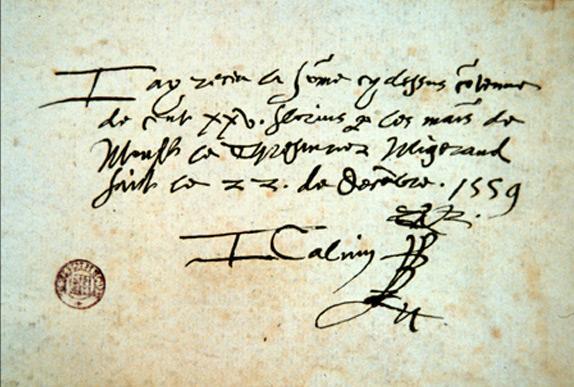I can well understand, my dear sisters, how alarmed you must be at these terrible events and that you feel rebellion and anger well up in your hearts, but you must strive even harder because God wants to work in you through His Holy Spirit. If men are indeed weak and easily troubled, women are even more so, – simply a fact of nature. But God, who has need of fragile vessels, knows very well how to make His virtue shine from His own weak creatures. This is why you must take refuge in Him, you must continually beseech Him and pray that the incorruptible seed which He has placed in you (thus enabling Him to adopt you as His children), may bear fruit in times of need and strengthen you to fight against any distress or affliction. You know what Saint Paul says : that God has chosen the foolish things of this world to confound the wise, the weak to confound the strong, and that which is held contemptible and despicable to destroy that which is of great price. This must encourage you not to give up hope, even though women are often not highly considered and least of all by men. For however proud they may be, and however much they may mock God and those who serve Him, nevertheless, men are forced to admire His virtue and His glory wherever they see it shine forth. And the weaker the vessel chosen by God, the more they will be forced to admit the existence of His virtue, which they cannot withstand.
May you see that God’s truth, wherever it may be, is hateful to all, men and women, scholars and fools, rich and poor, great and small. And if, because they are men or in positions of power, they take advantage of the situation in order to insult us all the more, (as you can see, they make fun of women and the poor as if it was not their business to speak of God and know their own salvation !) You can be sure that all this is to their detriment and will bring about their own condemnation. For so much as it pleased God to call to Himself both men and women (for in his eyes they are of equal worth) you must do your duty and give Him glory, according to the grace which He has given you, just as it has also been given to the great and famous, upon whom He has bestowed wisdom and virtue. Since Jesus Christ died for you and through Him you hope for salvation, having been baptised in His name, you must be eager and willing to give Him the honour which is His due. Since everyone is saved through Him, we must all, both men and women, fight the good fight. When He leads us into battle against His enemies, if we hold back, saying that we are weak and therefore can only abandon Him or disown Him, this is of little use ; all it can do is to condemn us as being unfaithful to Him. For He who sends us into battle also provides us with the necessary armour and the skill with which to fight. All we have to do is accept His help and let ourselves be guided by Him. He promised to give us the gifts of speech and wisdom in order to be victorious over our enemies. He promised to give strength and steadfastness to those who trusted in Him. He poured out His Spirit on all flesh and called His sons and daughters to prophecy, as the prophet Joël foretold – this is indeed the sign that He also gives us other gifts of grace in times of need – He pours forth succour to men and women, His sons and daughters, so that His glory may continue to shine forth. So we must be eager to claim these gifts of grace ; receive them with gratitude, for they will be of use to us in times of hardship. Consider the virtue and faithfulness of the women who were present at our Lord Jesus Christ’s death ; when the apostles had abandoned Him, they alone persevered, with wonderful steadfastness. Indeed, remember it was a woman, and not a man, who was sent to announce the resurrection to the apostles and they could neither believe nor understand the news she gave them. If, in the past, He has granted women so much honour and virtue, surely He has no less power to do the same now and it is His will to give them the same gifts of grace today. How many thousands of women have not hesitated to give up their lives to announce His kingdom, so that the name of Jesus Christ may live for evermore ? And God made their sacrifice bear fruit : through their faith they have been greatly honoured by the whole world, as were the martyrs before them. It is not necessary to go any further ; it is easy for us to comprehend that God needs them day after day to witness for Him and gain victory over His enemies – in fact, there is no more convincing sermon than their faithfulness and perseverance in confessing Christ’s name. Do you not see that these words of our Lord are deeply rooted in their hearts : He who denounces me before men will be denounced by me before God my Father and he who confesses my name will be defended by me before my Father. They did not hesitate to leave behind this wretched life in order to receive another, better, fuller and eternal one. So reflect on these excellent examples, both old and new, to give you strength when you feel faint and you will find peace ; He has in the past used weak vessels to achieve great works. Bear in mind the honour which He has given you, in His desire to bring you to Himself. Rest assured that He has the power, either to keep you alive, if it be His will to employ you further in His service, or else to exchange this life of yours for another, better one to come. Indeed, your happiness lies in giving up this wretched life on earth for the greatness of His glory and eternal life with Him. It is for this that we have been born into this world and that God’s grace has shone into our hearts, that we may glorify Him in our life and in our death, and that we may, at some time, be in complete union with Him.
May the Lord give you grace to meditate on these words and write them in your hearts so that you may be in perfect harmony with His will. Amen.
(Geneva, September 1557)


